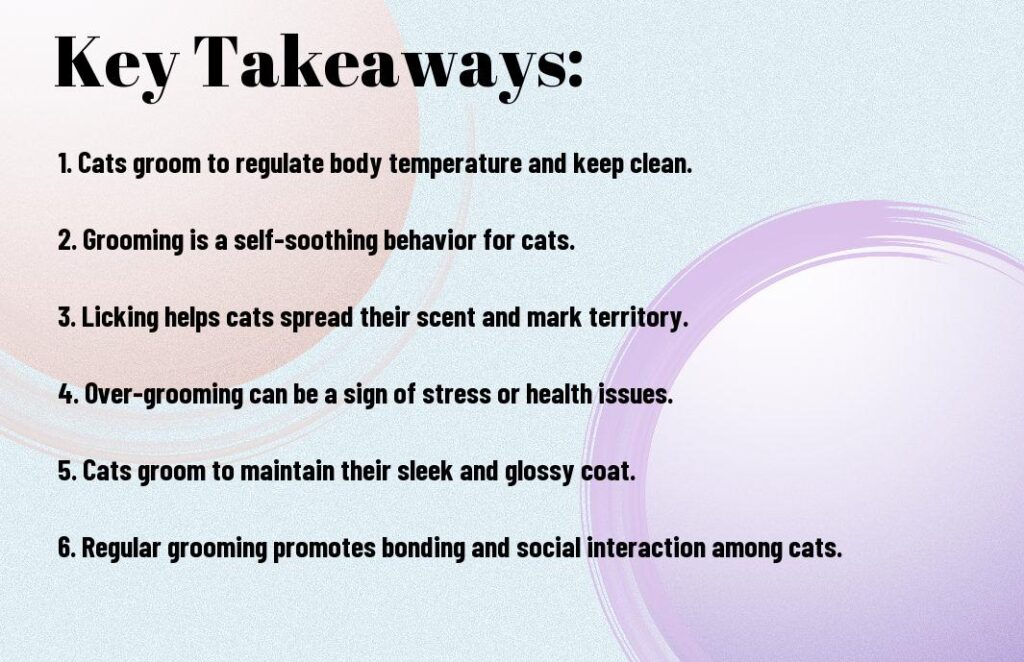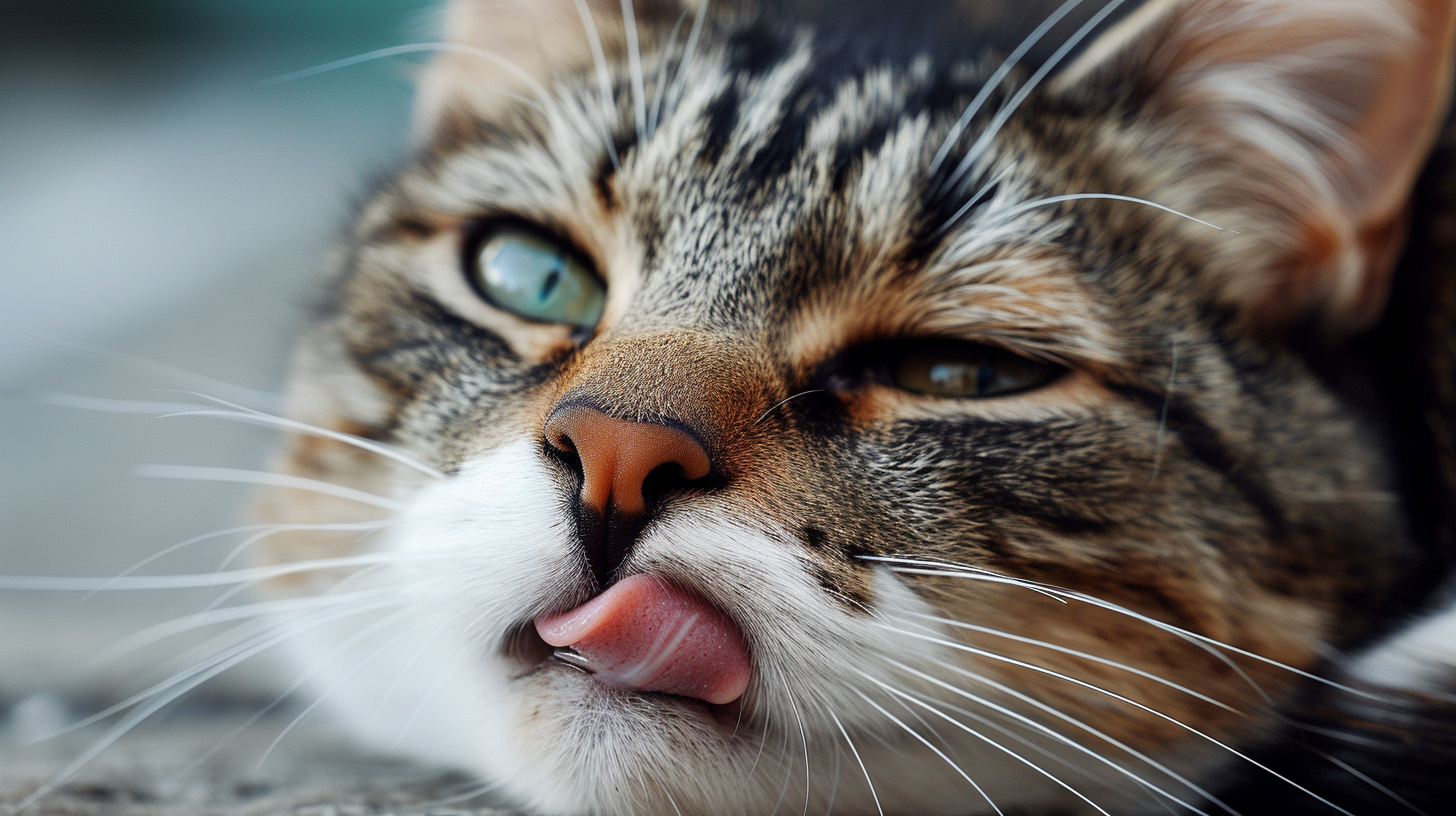If you’ve ever observed your feline friend, you may have noticed their consistent grooming and licking habits. This behavior might seem peculiar to you, but it is quite natural for cats. Grooming is an essential aspect of your cat’s daily routine and is critical to their overall well-being. In this blog post, we will delve into the reasons behind this behavior, including the benefits of grooming, potential dangers, and how you can support your cat’s grooming habits. By gaining a deeper understanding of your cat’s grooming behavior, you can enhance their quality of life and strengthen your bond with your feline companion. So, let’s explore why cats groom and lick themselves so often.

The Science of Self-Grooming
Some of the most fascinating aspects of cat behavior are in their grooming habits. You may have wondered why your cat seems to spend so much time grooming itself, and the truth is, there’s a lot more to it than just keeping clean. Let’s dive into the science of self-grooming and explore the reasons behind this behavior.
Evolutionary Background
As natural hunters and solitary animals, cats have evolved to be meticulous groomers. In the wild, grooming serves several important purposes for survival. Firstly, it helps to keep their fur clean and free from parasites, which can be particularly dangerous for a solitary animal. Additionally, grooming helps to distribute natural oils throughout their fur, keeping it healthy and providing insulation from the elements. In the wild, a cat with matted, dirty fur is at a distinct disadvantage when it comes to hunting and avoiding predators.
Physical Benefits of Grooming
Aside from the practical purposes of grooming, there are also numerous physical benefits for your cat. By licking their fur, cats remove loose hair, dirt, and debris. This helps to prevent matting and reduces the risk of hairballs forming in their digestive system. Additionally, the act of grooming stimulates blood flow to the skin and can provide a form of natural massage, keeping your feline friend physically healthy and comfortable.
Psychological Aspects of Grooming
Grooming also serves an important psychological function for your cat. When they groom, they are not only cleaning themselves but also engaging in a comforting, self-soothing behavior. This can be particularly important for reducing stress and anxiety, as well as providing a sense of security and relaxation. Additionally, grooming is a form of social behavior for cats, often seen between bonded individuals. When they groom each other, it helps to strengthen social bonds and maintain a sense of harmony within the group.
By understanding the evolutionary, physical, and psychological aspects of grooming, you can gain a deeper appreciation for this seemingly simple behavior in your feline companion. It’s not just about staying clean – grooming plays a crucial role in your cat’s overall well-being.
Behavior and Social Dynamics
Now, let’s explore the reasons behind your feline friend’s frequent grooming habits. Cats are known for their meticulous grooming routines, spending a significant amount of time licking and grooming themselves. This behavior is deeply rooted in their social dynamics and serves multiple purposes in their daily lives.
Grooming as a Social Activity
One of the primary reasons why cats spend so much time grooming themselves is to maintain social bonds with other cats. When cats groom each other, it helps to establish and strengthen their social hierarchy within a group. Additionally, grooming also helps to diffuse tension and conflicts among cats, as it is a form of social bonding and reassurance. Therefore, when you see your cat grooming itself, it is also an indication of their desire to maintain social harmony and relationships within their environment.
Communication through Grooming
Another important aspect of your cat’s grooming behavior is its role in communication. When your cat grooms itself, it leaves its scent on its fur, creating a unique signature that communicates its presence to other cats. This serves as a form of non-verbal communication, allowing your cat to mark its territory and assert its presence in the environment. Additionally, grooming also serves as a way for cats to communicate affection and trust towards other cats. When a cat allows another cat to groom it, it is a sign of closeness and bonding within the group.

Health Implications
Not only is grooming essential for maintaining a clean and healthy coat, but it also plays a crucial role in your cat’s overall well-being. Regular grooming helps your cat to stay clean, remove loose fur, and regulate body temperature. However, excessive grooming can lead to some health implications that you need to be aware of.
Indicators of Well-being
One of the positive aspects of grooming is that it can serve as an indicator of your cat’s well-being. When your cat is healthy and content, grooming will be a regular and methodical part of their routine. You will notice that their coat is clean, shiny, and free of any mats or tangles. This regular grooming also helps to distribute natural oils throughout the fur, keeping it healthy and moisturized.
Compulsive Grooming and Health Concerns
However, compulsive grooming can be a cause for concern. If your cat is grooming excessively, to the point of causing bald patches or skin irritation, it could be a sign of an underlying health issue. Compulsive grooming can sometimes indicate a skin condition, parasites, allergies, or even psychological stress. In such cases, it is important to consult with your veterinarian to determine the underlying cause and address any potential health concerns.
Does a Cat’s Grooming Behavior Indicate Their Emotional State?
Observing cats grooming behavior happiness can offer valuable insight into their emotional state. A contented feline will often engage in thorough grooming rituals, while a stressed or anxious cat may display irregular grooming habits. Monitoring their grooming behavior can help owners understand and address their pet’s emotional well-being.
Human Interaction and Grooming
Unlike other animals, cats are known for their fastidious grooming habits. However, their grooming behavior can be influenced by human interaction in various ways.
Influence of Human Contact on Grooming Habits
Your interaction with your cat can have a direct impact on their grooming habits. Cats who receive regular attention and affection from their owners are more likely to exhibit healthy grooming behaviors. On the other hand, a lack of interaction or neglect can lead to stress and anxiety in your cat, which may manifest in excessive grooming or self-licking. It’s important to be mindful of the amount of attention and care you give to your cat to ensure they maintain a healthy grooming routine.
How Owners Can Support Healthy Grooming
As a cat owner, there are several ways you can support your feline friend’s grooming habits. Providing regular brushing and grooming sessions not only helps in maintaining their coat but also strengthens the bond between you and your cat. Additionally, creating a comfortable and stress-free environment at home, including a balanced diet and regular veterinary check-ups, can contribute to your cat’s overall well-being and grooming habits. By taking an active role in supporting your cat’s grooming needs, you can ensure they maintain a healthy and shiny coat while also reducing the risk of skin infections and other health issues.
To wrap up
Understanding why cats groom and lick themselves so often is crucial to properly caring for your feline companion. As we have explored, grooming is a natural instinct for cats that serves multiple purposes, including staying clean, regulating body temperature, and marking territory. Additionally, excessive grooming can indicate stress, anxiety, or an underlying health issue that may require veterinary attention. By observing your cat’s grooming habits and providing a safe and stimulating environment, you can ensure that your feline friend stays healthy and happy. Recognizing the importance of grooming in a cat’s life will ultimately strengthen your bond and enhance your understanding of their behavior.
FAQ
Why do cats groom and lick themselves so often?
Cats groom and lick themselves to regulate body temperature, keep clean, and release natural scents. Grooming also helps with relaxation and stress relief for cats. It is a natural behavior that is essential for their overall health and wellbeing.
How often should I expect my cat to groom itself?
Cats typically spend 30-50% of their waking hours grooming themselves. This can vary based on the cat’s age, breed, and overall health. It is normal for cats to groom themselves multiple times a day, often after eating, waking up, or interacting with their environment.
When should I be concerned about my cat’s grooming habits?
If you notice a sudden change in your cat’s grooming habits, such as excessive licking, bald patches, or skin irritation, it may indicate an underlying health issue or stress. In such cases, it is important to consult with a veterinarian to rule out any potential medical concerns and ensure your cat’s wellbeing.

Hello there, I am Iftekhar Ahmed. I am the owner of Mishka & The Cat Corners. I love to explore and write on various topics about cats

